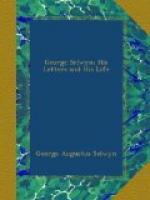Charles you say has not wrote to you. There is no accounting for that or for him but by one circumstance, and that is, that the gratification of the present moment is the God of his Idolatry. You mention his credit with Lord North.(96) I know for a certainty that Lord North disavows that which I know he once gave him. “He will,” they say, “manage this, and will settle that, with the Minister.” Stuff! The Minister, whoever he happens to be, will settle this matter with Charles, and say, “Sir, I know you want me, and that I do not want you, but in a certain degree. Speak, and be paid, as Sir W. Young was.” Alas, poor Charles! Aha promissa dederat. You say that you have not had a line from Lady H(olland); have you then wrote to her? I will add more to this if I see occasion, after I have been to talk with Lavie, who really means, I believe, to serve you with great fidelity, and reasons about this matter with great nettete and percision.
(92) James Hare (1749-1804); son of Richard Hare, apothecary, of Limestone; grandson of Bishop Francis Hare; at Eton with Fox and Carlisle, and afterwards entered Balliol College, Oxford. As a young man he was considered more brilliant than Fox, and more was expected of his future. He sat for Stockbridge from 1772-1774, and for Knaresborough from 1781 to his death. Like all of the fashionable men of his day, he played heavily. In 1779 he had become deeply involved in debt, but obtained the post of Minister Plenipotentiary to Poland, which he held until 1782; in 1802 he was very ill at Paris, where Fox made him frequent visits. He died at Bath. Lady Ossory described his wit as “perhaps of a more lively kind than Selwyn’s.” Storer left him a legacy of 1,000 pounds.
(93) Fox’s debt to Carlisle.
(94) Henry Thomas, afterwards second Earl of Ilchester (1747-1802); the cousin and companion of Fox, and as great a gambler. “Lord Stavordale, not one-and-twenty, lost eleven thousand last Tuesday, but recovered by one great hand at hazard.”
(95) Lord Holland had amassed a large fortune when Paymaster-General, and on this account his unpopularity was so great as to amount to public detestation.
(96) Frederick North, second Earl of Guildford, known in history as Lord North (1732-1792); Chancellor of the Exchequer, 1767; First Lord of the Treasury, 1770 to 1782; Secretary of State, 1783 (March to December); succeeded to Earldom of Guildford, 1790.
(1774,) January 18, Tuesday, Chesterfield Street.—I received yesterday your extreme kind letter, while I was at Lord Gower’s at dinner; which dinner, by the way, or the supplement to it, lasted so long, that I have increased my cough by it greatly, and am so unable to go this morning to Court, that I think now of putting on my clothes in the evening only, and so going, as I did last year, to the King’s side, to make her Majesty my bow as she passes from that apartment to the ball-room. We had yesterday at dinner Dick Vernon and Keith Stewart only, besides Lord Gower’s family.




